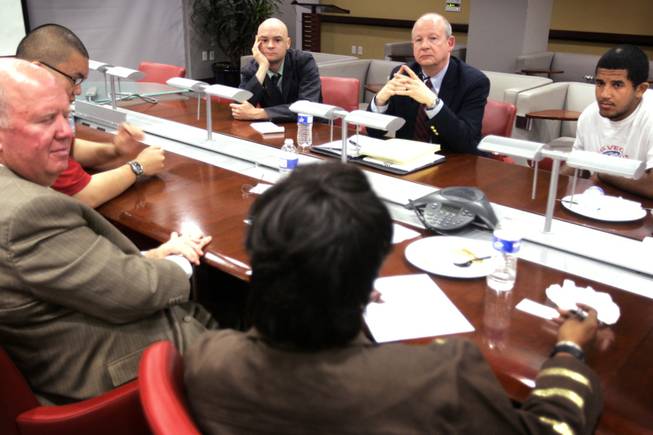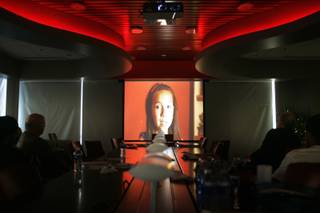
Sun columnist Patrick Coolican, clockwise from top, leads a discussion with Marc Hechter, Palo Verde High School chair of social studies, William Johnson, a student athlete at Las Vegas High School, Shirley Webb, a science teacher at Mack Middle School, Ken Turner, special assistant to the superintendent and Zhan Okuda-Lim, who is involved with student government at Valley High School after a screening of the education documentary “Waiting for Superman” at the Greenspun Media Group building in Henderson Wednesday March 30, 2011.
Wednesday, April 6, 2011 | 2:01 a.m.
Sun coverage
The film “Waiting for Superman” has captivated education reformers for its tough portrayal of failing schools and intransigent teacher unions. Although directed by progressive Davis Guggenheim, who directed Al Gore’s global warming documentary “An Inconvenient Truth,” the movie has pleased conservatives and Democratic education reformers.
Sun columnist J. Patrick Coolican screened the documentary last week and then led a discussion about the film among students, teachers and a Clark County School District administrator.
(See Coolican’s accompanying column today and his previous column about the film.)
Participants were two high school seniors — Zhan Okuda-Lim, from Valley High School and a student representative to the Nevada State Board of Education, and William Johnson, a student athlete at Las Vegas High School; Ken Turner, special assistant to Schools Superintendent Dwight Jones; and two teachers — Shirley Webb, seventh-grade science teacher at Mack Middle School, and Marc Hechter, chairman of the social studies department at Palo Verde High School.
“Waiting for Superman” follows five children whose parents enter them into lotteries to get them into high-achieving schools.
After the viewing, Coolican asked for their impressions, and they began by expressing their outrage that a child would need to win a lottery to receive a quality education.
Zhan Okuda-Lim, Valley High student: It’s a disgrace to this nation, as far as I’m concerned, because if we look ahead to the future, we need to be competitive. If we’re going to have a better economy, we need to be competitive. If we’re going to move forward in this country and in this world we have to make sure we have an educated populace.
Ken Turner, School District official: It seems to me that the system ought to be able to accommodate the idea that every child is entitled to success. Out of the whole movie, it seemed to jump to a clear consensus around the idea that you don’t do it without great teachers and great leaders.
Shirley Webb, Mack Middle School teacher: I’m like anybody else — I don’t see why it’s not possible, whether it’s a charter school, whether it’s a voucher system, whether it’s public school. I don’t understand why that is not possible for every child to have the education and go as far as they can.
William Johnson, Las Vegas High athlete: I’ve heard a teacher, as they said in the movie, say, “No matter if you learn or not, I still get paid.” I’ve had a teacher like that, but it just depends on whether the students care about their education as much as the teachers care about their education, and their parents care about it.
Marc Hechter, Palo Verde High teacher: If we don’t prepare people right, if we don’t recruit right, if we don’t keep the teachers in the classrooms, not a lot of success is going to happen ... I’ve only been here 10 years as a teacher. I’ve seen colleagues of 30 years put just as much sweat and effort in their 30th year as I put in my first. So to demean a profession by saying quality teachers matter, but public schools don’t have any, which is a message that comes out of that movie, isn’t going to be particularly positive.
Okuda-Lim: Teachers are very important. Dynamic leadership is very important. Having the resources and the facilities is extremely important. But the other side of the street, the other direction when you’re driving comes from home. The community, the parents, the students especially need to be very actively engaged in education.
Johnson: There are many different options. There are junior colleges, community colleges, ITT Tech, there are two-year colleges you can go to that will get you ready. Then you can always transfer to go to a four-year college. Anything you want to do, you have to set your mind to it.
Okuda-Lim: My parents have told me “you have to go to school to get your education. Get involved, do things.” I’ve had my family always supporting me along the way — No. 1. No. 2, the schools I’ve been to, I’ve had outstanding teachers. No. 3: My peers and I have supported each other and driven each other.
On the question of performance pay, Webb and Hechter favor a system that would reward an entire school, not just a few teachers.
Webb: The school I was in, the whole school got a bonus — from the cafeteria, the bus drivers, because it takes everybody in the school — not just one teacher in the classroom.
Hechter: If a system could be created that recognizes both the nature of the school’s success and then a way to balance different components of added value of successful teachers, I think most teachers would be more than willing to sign on to that. I certainly would. I think the whole idea (of teacher performance) is a lot more collaboration, and it would be a better approach than finger-pointing.
Johnson: A lot of classmates of mine are seniors who struggle with reading and comprehending stuff. That’s just because they didn’t take it in when they really needed to. In elementary school they ran over and over, learned, were tested on their comprehension. And then they passed through middle school, and now they still read on the same level they did when they were in elementary school. They haven’t tried to raise it up and try to move forward.
Turner: It really is about creating a culture where it’s cool to be smart. It’s not trivial what students bring and what parents bring. (Schools) are little ecosystems, and it’s a remarkable thing when it happens and it goes viral. As our conversations go around, it begins with unifying folks around a vision. We happen to be using a phrase “Ready by exit.” What is means to be “ready” really is that you can step into a college if that’s your wish and compete, instead of going remedial. And if you want to go into the workforce, you’re ready. You have to have great leadership, teachers and leaders.
(Editor’s note: The Colorado Growth Model provides a common understanding of how individual students and groups of students progress from year to year toward state standards based on where each individual student begins. The model focuses attention on maximizing student progress over time and reveals where, and among which students, the strongest growth is happening and where it is not. The model shines a spotlight on the state’s most effective schools and districts — those that produce the highest sustained rates of growth in student progress. These schools and districts may or may not be districts or schools with the highest test scores every year.)
Turner: What do I contribute on my watch to this child’s success? And the fabulous thing with our experience in Colorado is, I think it’s going to be the same thing here in Nevada that this growth model has shown, it doesn’t matter what the socioeconomic background of youngsters happens to be. If you know where students begin, it doesn’t matter, wealthy or poor. Where are they functioning now? Because the only gap that matters is the one that separates them, that child from the expected learning targets. And you can work on that. If they’re not yet proficient, then you can work on that. If they’re already proficient, the goal is to keep up. If they’re already proficient, there should be some hope that they can move up. Now you’ve embraced every student. Teachers are folks to invest in, because absent them it’s not going to happen.
Johnson: The whole school; the coaches, the teachers, the bus drivers. Everyone needs to be a community, and we all need to work together as a family. ...
Hechter: I have great aspirations, as many aspirations as I had 11 years ago and I assume you have just as many as you have when you started many years ago.
Webb: I certainly do … more, as a matter of fact.


Join the Discussion:
Check this out for a full explanation of our conversion to the LiveFyre commenting system and instructions on how to sign up for an account.
Full comments policy